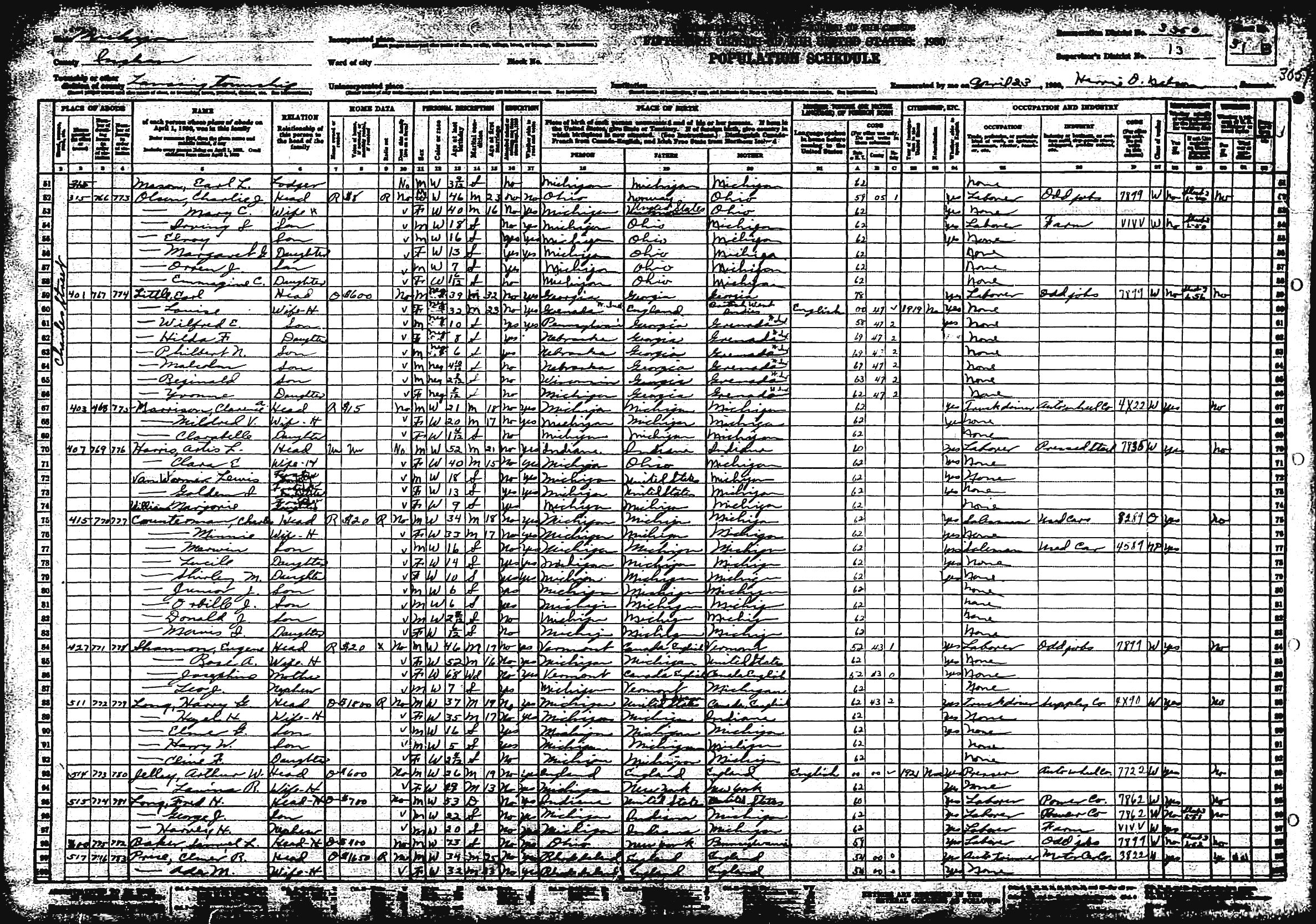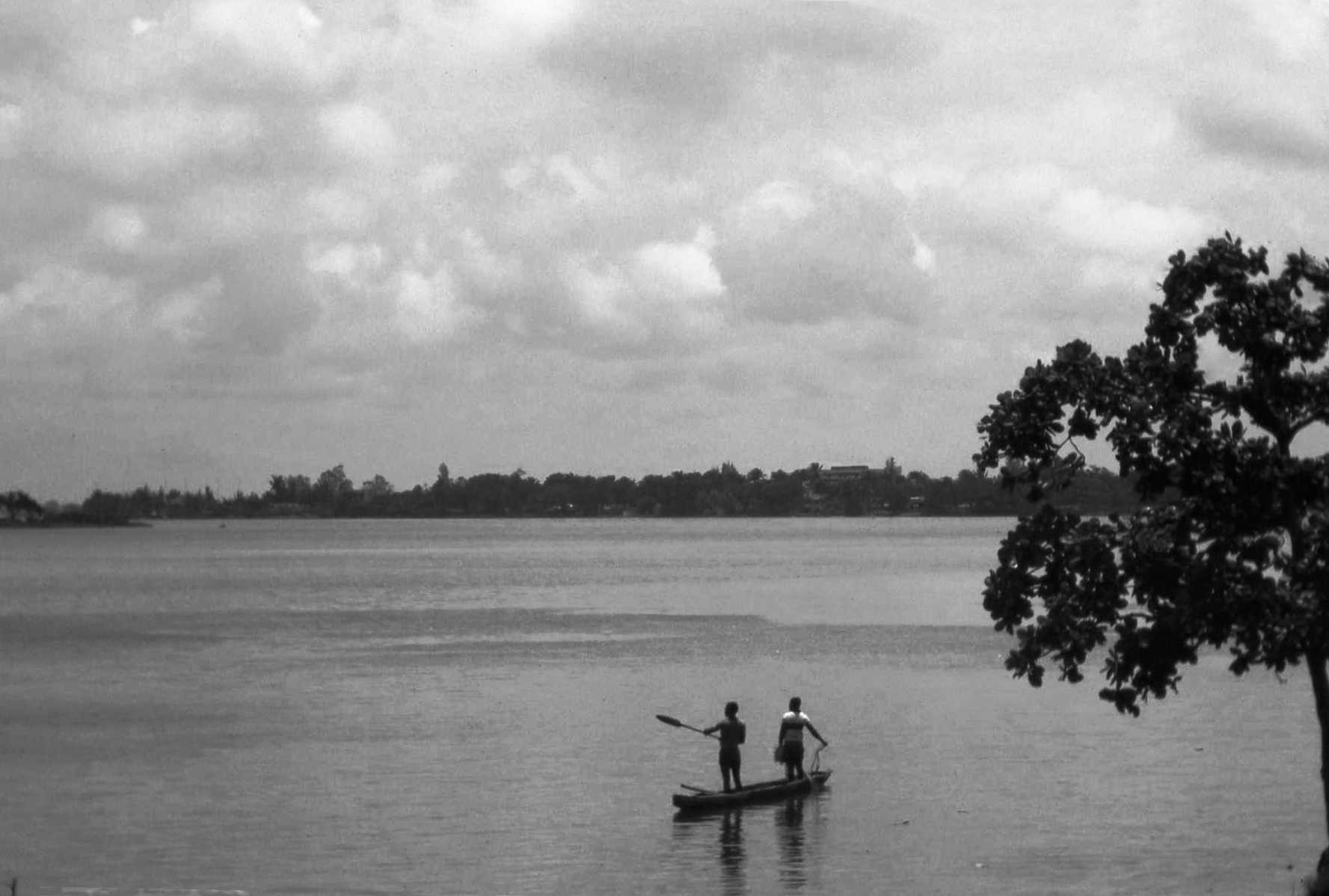|
Nyboma Mwan'dido
Nyboma Mwan'dido (or Muan'dido), often simply Nyboma (b. 1952), a prominent Congolese soukous tenor vocalist, has been over a fifty-year span a leading member of several outstanding bands, including Orchestre Lipua Lipua, Orchestre Kamale, Les Quatre Étoiles, and Kékélé, in addition to performing and recording as a solo artist. He is widely recognized as one of the best singers in Congolese music. Biography 1952-1970: Early years and first bands: Baby National and Negro Succès Nyboma was born on 24 December 1952 in Nioki, a river town 200 km northeast of the capital of what at the time was the Belgian Congo, later the Republic of the Congo and Zaire, and is now the Democratic Republic of Congo. He learned to sing as a child in Nioki, in the church choir. He sang in the school chorus when his family moved to Kinshasa while he was still in primary school. Early bands that Nyboma joined were l'Orchestre Baby National and Orchestre Negro Succès, although sources differ ... [...More Info...] [...Related Items...] OR: [Wikipedia] [Google] [Baidu] |
Nyboma
Nyboma Mwan'dido (or Muan'dido), often simply Nyboma (b. 1952), a prominent Congolese soukous tenor vocalist, has been over a fifty-year span a leading member of several outstanding bands, including Orchestre Lipua Lipua, Orchestre Kamale, Les Quatre Étoiles, and Kékélé, in addition to performing and recording as a solo artist. He is widely recognized as one of the best singers in Congolese music. Biography 1952-1970: Early years and first bands: Baby National and Negro Succès Nyboma was born on 24 December 1952 in Nioki, a river town 200 km northeast of the capital of what at the time was the Belgian Congo, later the Republic of the Congo and Zaire, and is now the Democratic Republic of Congo. He learned to sing as a child in Nioki, in the church choir. He sang in the school chorus when his family moved to Kinshasa while he was still in primary school. Early bands that Nyboma joined were l'Orchestre Baby National and Orchestre Negro Succès, although sources differ ... [...More Info...] [...Related Items...] OR: [Wikipedia] [Google] [Baidu] |
Pan-Africanism
Pan-Africanism is a worldwide movement that aims to encourage and strengthen bonds of solidarity between all Indigenous and diaspora peoples of African ancestry. Based on a common goal dating back to the Atlantic slave trade, the movement extends beyond continental Africans with a substantial support base among the African diaspora in the Americas and Europe. Pan-Africanism can be said to have its origins in the struggles of the African people against enslavement and colonization and this struggle may be traced back to the first resistance on slave ships—rebellions and suicides—through the constant plantation and colonial uprisings and the "Back to Africa" movements of the 19th century. Based on the belief that unity is vital to economic, social, and political progress and aims to "unify and uplift" people of African ancestry. At its core, pan-Africanism is a belief that "African people, both on the continent and in the diaspora, share not merely a common history, but a c ... [...More Info...] [...Related Items...] OR: [Wikipedia] [Google] [Baidu] |
Malcolm X
Malcolm X (born Malcolm Little, later Malik el-Shabazz; May 19, 1925 – February 21, 1965) was an American Muslim minister and human rights activist who was a prominent figure during the civil rights movement. A spokesman for the Nation of Islam until 1964, he was a vocal advocate for Black empowerment and the promotion of Islam within the Black community. A posthumous autobiography, on which he collaborated with Alex Haley, was published in 1965. Malcolm spent his adolescence living in a series of foster homes or with relatives after his father's death and his mother's hospitalization. He committed various crimes, being sentenced to 10 years in prison in 1946 for larceny and burglary. In prison he joined the Nation of Islam (adopting the name MalcolmX to symbolize his unknown African ancestral surname while discarding "the White slavemaster name of 'Little'"), and after his parole in 1952 quickly became one of the organization's most influential leaders. He was the public ... [...More Info...] [...Related Items...] OR: [Wikipedia] [Google] [Baidu] |
Ibrahima Sylla
Ibrahima Sylla (2 April 1956 – 30 December 2013) was a Senegalese record producer born in Ivory Coast and founder of the African music label Syllart Records. He was an internationally acclaimed musician whose production and music direction defined popular African music. From West African dance, to Congolese Soukous (sung in Lingala), to melodic griot-led songs, Sylla's signature as a music producer is unmistakable. He has demonstrated his familiarity with many contemporary African musical genres, and he has worked with most of Africa's musical greats. Biography Sylla was born in the Ivory Coast, into a prominent family; his father was Guinean (French Guinea) and was an influential public figure who was well known in West Africa, and whose work took the family to Dakar in Senegal. Sylla developed his love for music whilst studying at a university in Paris, France. He released compilation albums of his favorite Salsa music, and from 1980 he embarked on record production work. He f ... [...More Info...] [...Related Items...] OR: [Wikipedia] [Google] [Baidu] |
Wuta Mayi
Gaspard Wuta Mayi, commonly known as Wuta Mayi, is a Congolese rumba and soukous vocalist and composer from the Democratic Republic of the Congo (DRC). From 1974 to 1982, he was a member of the band TPOK Jazz, led by Franco (François Luambo Makiadi), which dominated the Congolese music scene from the 1960s through the 1980s. Since leaving TPOK Jazz he has recorded and performed as a solo artist, in addition to being one of the four members of the "supergroup" Les Quatre Etoiles (The Four Stars), and subsequently a member of Kékélé. Background Wuta Mayi was born on 9 August 1949 at Leopold General Hospital in then Leopoldville, now Kinshasa, the capital of, and largest city in, what was then the Belgian Congo, was later (among other names) Zaire, and is now the Democratic Republic of the Congo. This singer has been known by a variety of names; one source notes that "Gaspard Wuta Mayi is also known as Gaspard Wuta, Paschal Gaspard Mayi, Wuta Mayandi Yundula and Blaise Pa ... [...More Info...] [...Related Items...] OR: [Wikipedia] [Google] [Baidu] |
Syran Mbenza
Syran Mbenza (or M’Benza) (b. May 31, 1950) is a guitarist, originally from the Congo, who has lived in Paris since about 1981. He has recorded and performed prolifically over five decades, including as a solo artist; as one of the four members of the popular soukous "supergroup" Les Quatre Étoiles; as a founding member of the acoustic, Congolese rumba revival band Kékélé; in other bands; and in support of numerous artists. He has been described as one of the greatest guitar players of Africa. Career/History Early years: Congo/Zaire (1950 to early 1970s) Mingiedi "Syran" Mbenza was born on May 31, 1950, in a family of six, in Leopoldville (now Kinshasa), in what was then the Belgian Congo (and was later the Republic of the Congo, then Zaire, and is now the Democratic Republic of the Congo). Mbenza began to play guitar at about age 11. He grew up hearing the music of Franco, and taught himself to play guitar in Franco's style. He played in a number of local bands, and lear ... [...More Info...] [...Related Items...] OR: [Wikipedia] [Google] [Baidu] |
Bopol
Bopol Mansiamina (26 July 1949 – 7 November 2021), also known as Bopol or Don Paolo, was a prolific and renowned Congolese musician (bass player, guitar player most commonly as a rhythm guitarist, vocalist, composer, and producer). He recorded and performed extensively over four decades as a solo artist, as a member of leading African bands, and in support of many African musicians. Bopol was best known for his work in the 1980s and early 1990s as one of the four members of the Paris-based supergroup Les Quatre Etoiles (the 4 Stars) and as a solo artist. Career and history Early life Mansiamina was born 26 July 1949, in Leopoldville (now Kinshasa, Democratic Republic of the Congo) as Paul Mansiamina Mfoko (or M'Foko Mansiamina). 1969 to c.1980: Zaire, Cote d'Ivoire, Togo From 1969 to 1978 Bopol was based in Zaire and played in a series of bands. He joined many of the leading Congolese musicians of the past and next generations. After that time, he moved to West Africa for ... [...More Info...] [...Related Items...] OR: [Wikipedia] [Google] [Baidu] |
Paris
Paris () is the capital and most populous city of France, with an estimated population of 2,165,423 residents in 2019 in an area of more than 105 km² (41 sq mi), making it the 30th most densely populated city in the world in 2020. Since the 17th century, Paris has been one of the world's major centres of finance, diplomacy, commerce, fashion, gastronomy, and science. For its leading role in the arts and sciences, as well as its very early system of street lighting, in the 19th century it became known as "the City of Light". Like London, prior to the Second World War, it was also sometimes called the capital of the world. The City of Paris is the centre of the Île-de-France region, or Paris Region, with an estimated population of 12,262,544 in 2019, or about 19% of the population of France, making the region France's primate city. The Paris Region had a GDP of €739 billion ($743 billion) in 2019, which is the highest in Europe. According to the Economist Intelli ... [...More Info...] [...Related Items...] OR: [Wikipedia] [Google] [Baidu] |
Cote D'Ivoire
Ivory Coast, also known as Côte d'Ivoire, officially the Republic of Côte d'Ivoire, is a country on the southern coast of West Africa. Its capital is Yamoussoukro, in the centre of the country, while its largest city and economic centre is the port city of Abidjan. It borders Guinea to the northwest, Liberia to the west, Mali to the northwest, Burkina Faso to the northeast, Ghana to the east, and the Gulf of Guinea (Atlantic Ocean) to the south. Its official language is French, and indigenous languages are also widely used, including Bété, Baoulé, Dioula, Dan, Anyin, and Cebaara Senufo. In total, there are around 78 different languages spoken in Ivory Coast. The country has a religiously diverse population, including numerous followers of Christianity, Islam, and indigenous faiths. Before its colonization by Europeans, Ivory Coast was home to several states, including Gyaaman, the Kong Empire, and Baoulé. The area became a protectorate of France in 1843 and ... [...More Info...] [...Related Items...] OR: [Wikipedia] [Google] [Baidu] |
Abidjan
Abidjan ( , ; N'Ko script, N’ko: ߊߓߌߖߊ߲߬) is the economic capital of the Ivory Coast. As of the Demographics of Ivory Coast, 2021 census, Abidjan's population was 6.3 million, which is 21.5 percent of overall population of the country, making it the sixth most populous city proper in Africa, after Lagos, Cairo, Kinshasa, Dar es Salaam, and Johannesburg. A cultural crossroads of West Africa, Abidjan is characterised by a high level of industrialisation and urbanisation. It also is one of the most populous French-speaking cities in Africa. The city expanded quickly after the construction of a new wharf in 1931, followed by its designation as the capital city of the then-French colony in 1933. The completion of the Vridi Canal in 1951 enabled Abidjan to become an important sea port. Abidjan remained the capital of the Ivory Coast after its independence from France in 1960. In 1983, the city of Yamoussoukro was designated as the official political capital of Ivory Coast. Ho ... [...More Info...] [...Related Items...] OR: [Wikipedia] [Google] [Baidu] |




